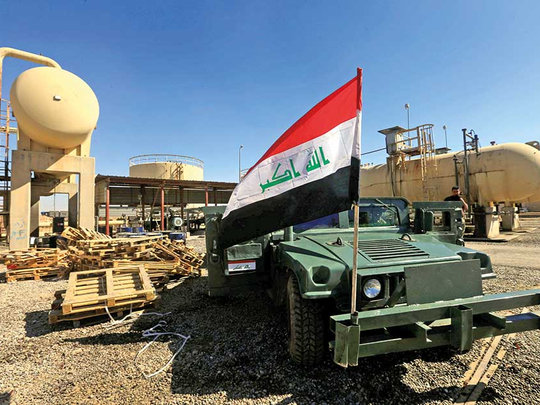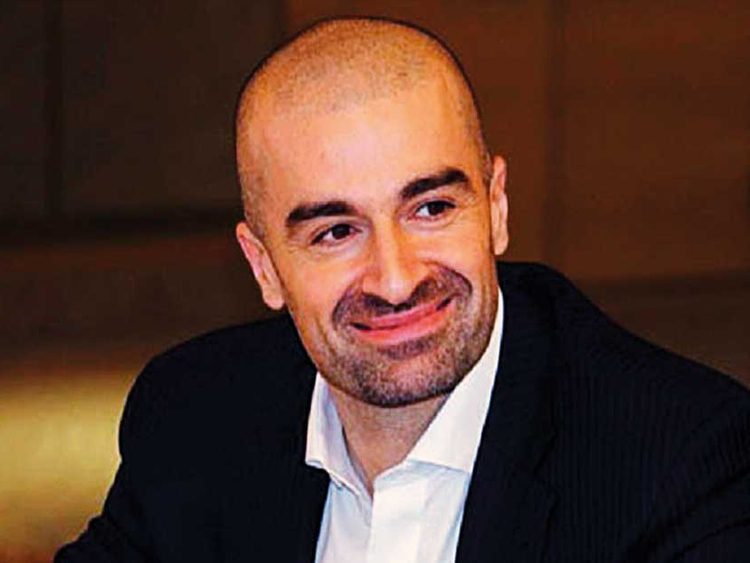
FISH KHABBOUR, Iraq — Turn on a television or scroll social media in Iraq over the past three weeks and by almost any measure, more conflict appears imminent between the federal government in Baghdad and the Kurdish region in the north.
Kurdish officials accuse federal forces — without corresponding evidence — of committing a slaughter last month when they seized control of 20 per cent of territory that had been long under Kurdish domain. Iraqi lawmakers demand prison sentences for Kurds who supported the Sept. 25 independence referendum.
Yet amid the acrimony, leaders in Baghdad and the Kurdish strongholds of Irbil and Sulimaniyah have also been exchanging almost daily phone calls, hoping to hash out solutions to problems exacerbated by that vote — and to get thousands of federal and Kurdish troops massed within each others’ sight lines to stand down.
The back-channel chats have taken on heightened importance since formal de-escalation talks stalled on Oct. 29, after only two face-to-face meetings.
“The channels of dialogue and communication have not been interrupted,” said Sa’ad Al Hadithi, a spokesman for Prime Minister Haider Al Abadi.
Three officials involved in the informal talks say they are discussing temporary arrangements to the most pressing issue for both sides: Control of Iraq’s Fish Khabbour border crossings with Turkey and Syria, where about one-fifth of Iraq’s oil exports pass through. The officials were granted anonymity to discuss a sensitive diplomatic matter.
This stab at conflict resolution illustrates the diffuse nature of Iraqi politics, where key power brokers sometimes have no formal or elected authority. It also highlights a dangerously fractured political spectrum in which elected officials can be eclipsed, sometimes by rival factions from within their party or even family.
While back-channel discussions have helped keep the border trade of oil, food, consumer goods between Turkey and Syria flowing — along with humanitarian aid from Iraq bound for Syria — over the past two weeks, they are far from any breakthrough.
Diplomats say that Iraq’s tradition of carrying out delicate negotiations in secret, often by people acting well outside their official roles, can be baffling to outsiders.
Riding a wave of victories over Daesh, Al Abadi ordered his troops in October to re-establish government control throughout the country. The independence referendum prompted him to include many areas long under Kurdish control.
While no official casualty statistics have been released, about 65 men died in clashes sparked by these advances, according to two military commanders familiar with the situation. Beyond the loss of life, the Kurdistan Regional Government lost face over the rapid withdrawals by their peshmerga security forces. It also lost much of its oilfields to federal troops, and with them the economic self-sufficiency that has underpinned the region’s de facto autonomy since 2005.
In late October, after advancing northward amid several short skirmishes, federal forces dug in about 16km from the Fish Khabbour oil terminal and the nearby cargo crossing with Turkey, one of the largest trading partners for both Iraq and the Kurdish region.
With tensions boiling, Baghdad on Oct. 28 announced a ceasefire and a round of negotiations between Iraqi and Kurdish military commanders, ostensibly to allow federal forces to take over the border without further bloodshed.
On Oct. 29, however, talks broke down, amid intransigence by the Kurds about the altered balance of power.
“The talks mixed security and politics,” according to Sheikh Jafar Moustafa, a veteran peshmerga commander and one of four Kurdish negotiators, who added that his side did not have the political authority to approve any agreement with the Iraqis.
“We had to get political approval for any deal,” he said, “and no political decision was forthcoming.”
At that point, the phone diplomacy increased among leaders like the Kurdish regional deputy prime minister, Qubad Talabani; Al Abadi’s deputy chief of staff; and Iraq’s intelligence chief.
These relationships have helped avert any new clashes near the border, despite a build-up of Iraqi forces, and helped keep the trade corridor open and oil exports flowing, albeit at a reduced rate, according to Turkish and Iraqi officials.
However, not all political factions in Baghdad or Kurdistan support de-escalation or a border deal.
Those include Iraqi Shiite politicians close to the Popular Mobilisation Forces, a paramilitary organisation made up of dozens of militias recognised by Iraq in 2014 as an auxiliary force to fight Daesh.
Although the militias are under the formal command of Al Abadi, some of their leaders are his parliamentary rivals and profess close allegiance to Iran’s Islamic Revolutionary Guard Corps.
On the Kurdish side, it is unclear who, exactly, could enforce any potential border compromise.
Mansour Barzani, the son of the longtime Kurdish leader Masoud Barzani, commands an elite Kurdish security force that is defending a ridge between an Iraqi artillery unit and the Fish Khabbour border. Last week, he said he would fight to death rather than allow the Iraqi federal troops to control the crossings. But a cousin, regional Prime Minister Nerchivan Barzani, supports a negotiated deal.
“Naturally when there is tension in the field and military confrontations take place, there are always needs to defuse such tensions,” said Safin Dizayee, a spokesman for Nerchivan Barzani. “The prime minister has, through various channels, maintained such contacts with the federal government,” he said, adding that the conversations “have helped create more understanding and build confidence.”
Meanwhile, in the second largest Kurdish city, Sulimaniyah, relatives of the former Iraqi President Jalal Talabani, who died last month, are immersed in their own feuds over control of Talabani’s party and the security force loyal to it.
Such divisions have scuttled one attempt to stave off military conflict between Baghdad and the Kurds.
In the aftermath of the independence referendum, Talabani’s eldest son, Bafel, began unilateral negotiations with Al Abadi. (Qubad Talabani is Bafel’s brother.)
Bafel Talabani, a British-educated Kurdish security commander who holds neither elected office nor a formal political role, said he took the initiative to counter what he saw as a firm determination by Baghdad to clip Iraqi Kurdistan’s autonomy.
He proposed a plan that would have federal forces and troops from the US-led coalition against Daesh take over a large military base near the oil-rich town of Kirkuk, along with federal forces and Kurdish forces loyal to his father’s party. The Kurds had controlled the base since 2014, when Iraq’s army retreated during the Daesh onslaught.
Bafel Talabani said the base deal would have given Al Abadi a political win amid the nationalist fervour in Baghdad, as well as allow Kurds to keep a toehold in what to many leaders is an essential piece to their independence plans. Kirkuk is coveted by both Baghdad and the Kurds because of its strategic oil reserves.
“It was a true compromise that would have saved lives,” Talabani said in a recent interview.
An aide to Al Abadi, and two Western diplomats, confirmed that such a deal had been proposed. Al Abadi gave Talabani until Oct. 16 to get a green light from the Kurdish leadership to implement the plan, or he would launch the operation to seize the area from Kurdish control.
Talabani said he could not build consensus among his father’s political party and the region’s ruling party, controlled by the Barzani family.
With the deadline past, Al Abadi instead ordered the federal forces to push into Kirkuk, and then farther north toward the Turkish border.












